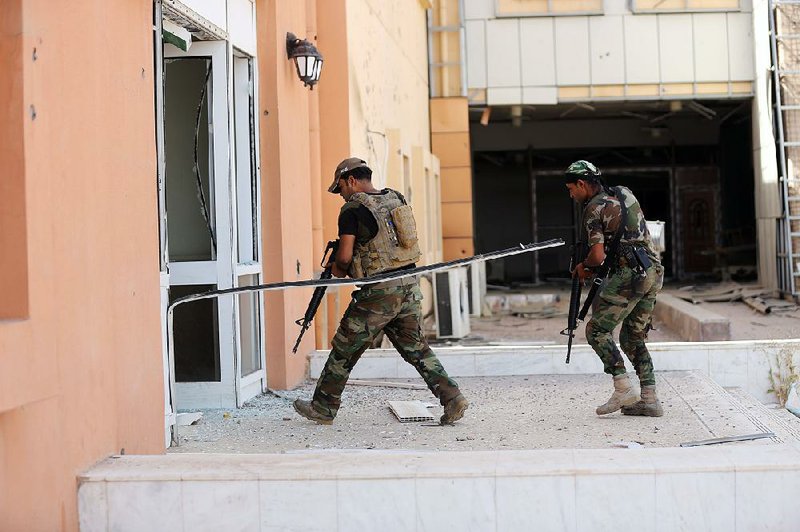FALLUJAH, Iraq -- Iraqi commanders are preparing to dislodge Islamic State fighters from pockets of territory in Fallujah's northern and western neighborhoods where the militants have dug in after largely fleeing their positions in the city center last week.
RELATED ARTICLE
http://www.arkansas…">Syrian fighters backed by U.S. enter ISIS hub
Before Iraqi forces rolled into central Fallujah under cover of U.S.-led coalition airstrikes, they were bogged down for weeks, trying to push through deep defensive trenches, tunnels and houses converted into bunkers by Islamic State militants on the city's southern edge. Now looking to the city's north, Iraqi commanders expect to encounter a similarly fierce fight.
"It's not going to be easy," Iraqi special forces Brig. Gen. Ali Jameel said of the battle for the last pockets of Islamic State resistance where an estimated 100 militants are largely surrounded.
"They are going to fight to the death because they have nowhere to run," he said.
Prime Minister Haider al-Abadi launched the offensive to retake Fallujah from the Islamic State on May 22. The Sunni-led extremist group has held the city west of Baghdad for more than two years.
Last week, Iraqi forces raised their flag above a government complex in central Fallujah and declared victory, saying 80 percent of Fallujah was under their control.
On Tuesday, however, the U.S.-led coalition, which has been conducting airstrikes in the offensive, said only a third of Fallujah can be described as "cleared," while other territory remains contested.
One of the militants' remaining strongholds is Fallujah's Jolan neighborhood, the northwestern corner of the city that was also the scene of some of the most persistent skirmishes between U.S. forces and insurgents in 2004 and 2007.
Its jumble of narrow streets and dense concentration of residential buildings is expected to make it harder to use airstrikes and armored vehicles. Additionally, thousands of civilians are still believed to be trapped in the Islamic State-held territory, according to the United Nations.
Capt. Muthhour Sabaar of the Anbar provincial police said his men fought alongside the Iraqi military's elite special forces as they pushed into central Fallujah last week from the south. Since then, his men have moved north and west.
"This fight will be our hardest yet," he said. The defenses in the remaining Islamic State neighborhoods are expected to mirror what his forces encountered in the southern edge -- the trenches, tunnels and fortified houses that are now shredded and collapsed from artillery fire and airstrikes.
Once his forces moved farther into the city from the south, there were no elaborate fortifications.
"Here, [extremist fighters] just ran away. Honestly, there were no defenses at all," Sabaar said, gesturing to the Nazzal neighborhood just south of the main east-west highway that roughly divides the city.
The safest routes through the city snake in and out of main thoroughfares. As one convoy of armored vehicles moved along the main highway, special forces Cpl. Ahmad Ahmad pointed to the liberated territory, including the Khalifa Mosque, one of the city's largest.
"It's cleared, but only from the outside. We don't know about the inside yet," Ahmad said. Iraqi forces advanced so quickly that teams specializing in defusing bombs were unable to keep up.
Along a road in central Fallujah, destruction is intermittent.
Sabaar, the provincial police captain, said the fighting on these streets was nothing like what he saw earlier this year in Ramadi, where hundreds of homemade bombs made progress painfully slow.
"Daesh believed this city was like a capital for them," Sabaar said, using the Arabic acronym for the Islamic State. "They never thought Iraqi forces would be able to break the city's walls."
A row of opulent homes bearing graffiti reading, "Property of the Islamic State, not for sale or rent," was scorched black by smoke. Iraqi forces driving through the neighborhood say the buildings were used as Islamic State command centers, and the fighters set them on fire to destroy sensitive documents as they retreated last week.
Overall, the level of destruction in Fallujah appears to be less than in Ramadi, where Iraqi forces and the coalition were criticized because many parts of the city were mostly destroyed in the fighting. Iraqi and coalition officials countered that most of the destruction in Ramadi was caused by Islamic State explosives.
Fallujah, which was under militant control longer than any other part of Iraq, is only 40 miles west of Baghdad. The Islamic State was able to build defenses in cities and towns like Ramadi and Hit because of their relative isolation from territory under the Iraqi government's control, he said.
A Section on 06/24/2016

